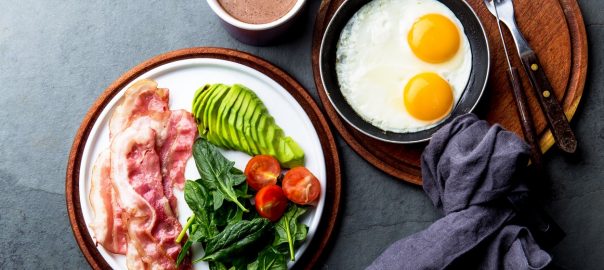
What to Expect with Losing Weight on a Low Carb Diet
Should A Low Carb Diet Be Used to Lose Weight?
Many people wonder if they should start a low carb diet to lose weight; check out our tips and insights in this article.
If you are looking to lose weight, a low carb diet could be the answer. However, there are also medical reasons why some people may choose to start a low carb or ketogenic diet. For example, a low carb diet has been shown to treat or ease the symptoms of conditions such as diabetes, epilepsy and other neurological disorders, metabolic syndrome and autism. This is because a low carb diet can cause major changes in the body and the brain which may be necessary for some people in order for their bodies to function optimally.
On the other hand, low carb diets can also be very helpful for weight loss. When weight loss is your goal, it is often recommended to lower your carb intake, since reducing carbs tends to decrease appetite levels and allow your body to burn through stores of fat tissue instead of the quickly available energy from carbs.
When setting weight loss goals, it is important to factor in everything in your life, from sleep to exercise, diet and even stress management. In this article we narrow down our focus to diet and, specifically, how to start a low carb diet for weight loss. Be sure to speak with a physician before making any drastic changes to your diet to ensure those changes are right for you and you are doing them properly according to your health needs.
How A Low Carb Diet Works
The body’s primary source of fuel is glucose from carbohydrates since it is the quickest and easiest to use. That said, relying too much on carbs as a fuel source can cause blood sugar levels to fluctuate drastically during the day, and possibly lead to insulin resistance over time, a condition associated with diabetes. Luckily, the liver also can produce ketones from fat molecules, another type of usable energy. By consuming more high-fat foods and limiting carbs to a certain percentage of the diet (typically less than 10%), your body can adapt to using mainly ketones for energy, which can have positive effects on blood sugar levels and reduce insulin resistance and related health conditions. In fact, consuming too many carbs while in ketosis will cause you to fall out of ketosis and lose the fat-burning benefits of this state. This is why many people looking to lose weight may choose to embark on a ketogenic diet, as it has been shown to help people reduce body fat and build more muscle. Not sure if your body is in ketosis or maintaining in ketosis? We recommend trying this easy to use Ketone Breath Metre.
Low Carb Dieting Tips
If you have decided that a ketogenic or low carb diet is right for you, check out some of our tips below that can help you obtain the best results and experience!
- Gradually Eliminate Carbs
When you transition from a moderate or high carb diet to a low carb diet, cutting out carbs all at once can cause some unpleasant side effects as your body adjusts to this drastic new change. Carbs and fat produce different sources of energy – glucose and ketones, respectively – so when switching from one to the other, the body must become accustomed to this change before it begins running like normal again. Some people may experience headaches, weakness, sugar cravings and digestive issues if they do not eliminate carbs at a slow enough pace for their bodies to adapt. The good news is, you don’t have to go cold turkey on carbs right away!
To gradually eliminate carbs from your diet, you could measure your carbs on your regular high carb diet and then reduce that amount by 5-10 grams a day (or as directed otherwise) until you reach your desired carb intake goal (e.g. 15-30g per day, which is the typical range on a ketogenic diet). Remember that this will depend on your unique metabolism and physical activity levels, so do some research or speak to someone before starting a ketogenic diet.
If you normally eat carbs with every meal, you could start by reducing to two meals a day. Reduce things like bread, pasta, rice and white potatoes – or replace them with these low-carb options. Remember to eat enough protein and fibre during the transition so your body still has all the nutrients it needs to avoid feelings of hunger. Once the main high-carb foods in your diet have been eliminated, the final phase of the transition could include eliminating any fruits or vegetables that tend to be higher in carbs such as bananas, apples, grapes, legumes, squash and corn.
- Eat Whole Foods
A diet full of whole foods involves eating a variety of fresh fruit and vegetables; unprocessed, grass-fed meat; and healthy oils from things like salmon, olives, avocado, raw nuts and seeds and farm-raised eggs. The point is to eliminate as much processed and packaged food as possible. Making your own baked goods and snacks from scratch is also a great way to do this and customize the foods you love to your specific needs and preferences! Some common advice in the search for whole foods is to shop around the perimeters of the grocery store. This is where they tend to stock the produce and refrigerated foods such as meat, dairy and eggs, while the middle aisles of the store tend to be for shelf stable packaged foods.
Check out some of these easy snack and dessert recipes you can make at home:
- No Bake Low Carb Granola Bars
- Pistachio Truffle Fat Bombs
- Zucchini Chocolate Chip Breakfast Cookies
- Keto Coconut Dessert Bars
Don’t forget to browse our inventory for any ingredients you may need to make these recipes, such as sugar-free sweetener, sugar-free chocolate and nut butters.
- Build Your Meal Around Vegetables
We often plan our meals around a base of protein, such as chicken or beef, but when we cut carbs, we still need to make up for them in some other way. We still need to eat balanced meals, so aim to include a protein, fat and lots of fibre with every meal. Solely eating protein will cause hormonal imbalances in your body and digesting all of that meat will rob your body from precious energy and nutrients. Always be sure to include a source of fibre for good digestive health as well as healthy fats to increase nutrient absorption and keep you satiated.
- Find Low Carb Replacements for Your Favourite Foods
This one is not hard – thankfully! There are tons of low carb replacements for traditionally high-carb food available to low carb dieters. This is because most of the sugars in processed foods can be replaced with natural, low glycemic and low-calorie sweeteners. In addition, nut and seed meals are great replacements for traditional white flour in bread, pasta, tortillas and baked goods.
- Come Up with New Recipes That You Like
Really, when it comes to your diet, no one else can tell you the best things to eat. We all have different bodies, taste preferences, metabolisms and accessibility to different foods. With your health in mind, try to find a diet that works for you, featuring recipes that you and your family find fun and easy to make and eat! Trying out new recipes is a great way to discover things that you may never have known you liked. Plus, a new diet is a great excuse to start experimenting in the kitchen and trying new things from the grocery store!
Even trying out new ways of flavouring, seasoning and marinating your routine dishes can bring them to a new level. See our variety of low carb hot sauces, other sauces, seasonings and spices – you might just find some inspiration for your next meal!
Low Carb Starter Meal Plan
Meal planning is a great way to stay on track of a new diet and help you feel more organized, especially when your normal routine gets shaken up. It is also useful for making grocery lists and limiting trips to the store, and it can help you stay on a budget. Being prepared throughout the week with meal ideas and ingredients can also help ensure you won’t turn to carbs if you find yourself scrambling to make something with little time.
For every meal, try to make extra servings that can be had as leftovers the next day. This takes away a lot of the work and time that it takes to cook each and every meal – especially when you may no longer have the convenience of processed packaged food. You could freeze your leftovers so they stay fresh for longer in case you want to have a reserve of meal options when you are low on time. Save your future self with frozen leftovers!
Below, we share a sample of our low carb weekly meal plan that is simple enough if you’re just starting out. We have incorporated flexible recipes that allow you to make alterations as you see fit. You can find lots of these low carb meal plans by searching online. You could pick a couple and cycle in a new one every week – this even takes the work out of planning each week!
Monday:
Breakfast: Berry Protein Smoothie (add frozen vegetables instead of ice for extra fibre!)
Lunch: Cobb Salad with Egg, Avocado and Cheese
Dinner: Broccoli Chicken Casserole
Tuesday:
Breakfast: Egg, Spinach and Goat Cheese Omelette with Avocado
Lunch: Leftover Broccoli Chicken Casserole
Dinner: Baked Salmon with Mediterranean Cauliflower Rice
Wednesday:
Breakfast: Green Smoothie with Chia Seeds
Lunch: Leftover Mediterranean Cauliflower Rice and Greek Salad
Dinner: Cheesy Taco Skillet served with low carb tortillas
Thursday:
Breakfast: Keto Chocolate Chia Pudding – so good it’s like having dessert for breakfast!
Lunch: Keto Taco Salad with Leftover Cheesy Taco Skillet
Dinner: Shrimp Lettuce Wraps
Friday:
Breakfast: Egg, Spinach and Goat Cheese Omelette with Avocado
Lunch: Leftover Shrimp Lettuce Wraps
Dinner: Paprika Smoked Chicken with Lemon Zucchini Frites
Saturday:
Breakfast: Low Carb Pancakes – best paired with a sugar-free syrup and fresh berries!
Lunch: Instant Pot Keto Tuscan Soup
Dinner: Cheesy Garlic Burgers with Lemon Butter Zucchini Noodles
Sunday:
Breakfast: Breakfast Egg Muffins
Lunch: Leftover Instant Pot Keto Tuscan Soup
Dinner: Spinach Chicken Casserole
Get Started Today!
We hope that you learned something and enjoyed reading this article! If you would like to share your thoughts or experiences, head over to our Facebook and Instagram pages. We also love to read our reviews on Google, so if you enjoyed an experience you had with The Low Carb Grocery, please take a minute to let us know here.
You might want to consider subscribing to our Weekly Newsletters, too, for updates on the latest products and special sales!






